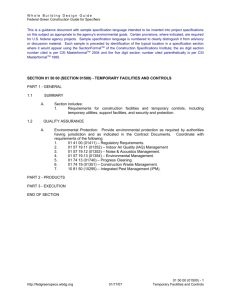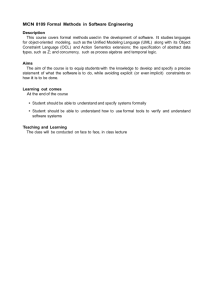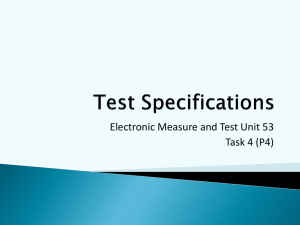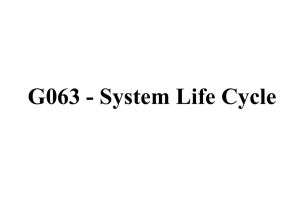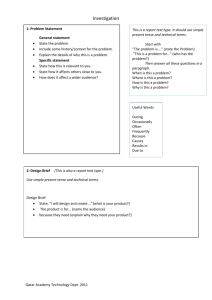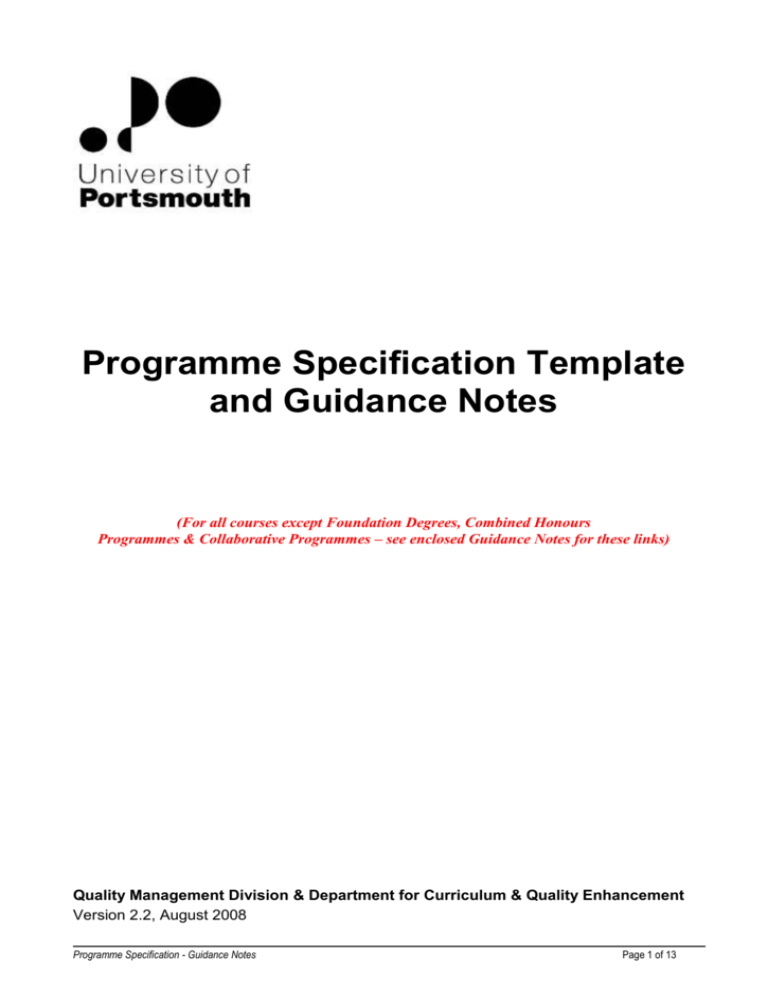
Programme Specification Template
and Guidance Notes
(For all courses except Foundation Degrees, Combined Honours
Programmes & Collaborative Programmes – see enclosed Guidance Notes for these links)
Quality Management Division & Department for Curriculum & Quality Enhancement
Version 2.2, August 2008
Programme Specification - Guidance Notes
Page 1 of 13
CONTROL PAGE1
Issuing Authority:
Owner:
Faculty:
Author(s):
Distribution List:
Classification:
Major Release Date:
Minor Release Date:
Last Change Date:
Review Date:
Effective Session:
Academic Council April 2003
Quality Management Division & Department
for Curriculum & Quality Enhancement
N/A
Dr Valda Bunker (update Dr Elaine Asser)
All academic staff
N/A
May 2002
May 2003
August 2008
August 2009
2009-2010
Withdrawn Date:
History
Version 2.2 is a modification of Version 2.1. Several minor amendments have been made.
The contents of this document are the copyright of the University of Portsmouth and all rights are reserved.
No part of this publication may be reproduced, stored in a retrieval system or transmitted, in any form or by
any means electronic, mechanical, photocopying, recording or otherwise, without the prior consent of the
University of Portsmouth.
Programme Specification - Add Course Title
Page 2 of 13
INTRODUCTION
The programme specification plays a central role in course approval and review. The framework for
the use of programme specifications was reaffirmed by Academic Council in May 2003 and is given
below.
Framework for the use of Programme Specifications
1.
The primary purpose of programme specifications will continue to be an integral part of
course approval and review with the principal intended audience being the academic
community.
2.
Programme specifications provide a concise description of the expected knowledge and
understanding and cognitive, practical and transferable skills of students who have
successfully completed the programme. They will describe the learning, teaching and
assessment strategies and programme and unit structures that enable those outcomes to be
achieved and demonstrated. In addition, information relating to student support, admissions
(including any issues relating to disability), evaluation, enhancement and indicators of quality
and standards, and regulations will also be included.
3.
Programme specifications will be prepared for all award-bearing courses at the University
and will follow the agreed University format (Quality Management Division). A programme
specification will be prepared for all single subject and interdisciplinary courses. Where a
course forms a route through an overarching programme of courses then generic
programme aims and learning outcomes may also be included.
4.
There is a separate Programme Specification for Single Honours. This is multipurpose and
will need to be adjusted for courses set at other than honours degree (eg Postgraduate
Programmes). The exceptions to this are Combined Honours, Foundation Degrees and
Collaborative Programmes, which have individual templates:
Single Honours and Postgraduate Programmes Template (multi purpose)
Combined Honours Programme Specification
Foundation Degree Programme Specification
Collaborative Programme Specification Template.
The Collaborative Programme Specification must not be subsumed within the home
delivered programme specification.
5.
Programme specifications for courses within the Combined Honours Degree Programme
Framework will be prepared for each pathway (“half” subject). If applicable (e.g. for
Professional Bodies), a single Combined Honours Programme Specification may serve to
describe the core learning outcomes that are achievable. This must be agreed with the
Head of Academic Development.
6.
The Single Honours, Foundation Degree and Collaborative Programme specifications will no
longer include the unit details for the course. The unit details must now be put onto a
Programme Specification - Add Course Title
Page 3 of 13
separate Course Structure Form (Quality Management Division website), which will be linked
to the Jupiter course structure database. The Combined Honours Programme Specification
will continue to contain the unit details for the “half” degree under 11.2 for the time being, but
a Course Structure Form for each combination must also be completed. All course
structures must be included with the Stage 2 and Stage 3 documentation prior to approval.
7.
The course or “subject” learning outcomes will be developed taking account of external
reference points (eg Subject Benchmark Statements, Framework for HE Qualifications,
Occupational Standards etc) and will be achievable regardless of the units selected by
students. It is also acceptable, although not encouraged, to include conditional learning
outcomes. These will be expressed as such and will be conditional on the units selected.
8.
The programme specification learning outcomes will be set at threshold level, i.e. it will be
expected that students who have successfully completed the course will be able to
demonstrate the learning outcomes. This will be made clear in the introductory wording.
9.
The Single Honours, Foundation Degree and Collaborative templates will include a learning
outcomes map, an assessment map and, in the case of foundation degrees, a key skills map
but the Combined Honours Assessment Map and Learning Outcomes Map are separate
documents:
10.
Learning Outcomes map - showing, at a minimum, where the programme learning
outcomes are demonstrated. It is optional to also include where the programme learning
outcomes are developed.
Assessment map - showing the range of assessments and their specifications (e.g.
length of examination, word count for essays, etc). In addition, a level-by-level
assessment strategy statement is now required (Section 15.1). This provides an
opportunity for you to explain the ranges of assessments selected and what you are
trying to achieve in terms of the development and demonstration of knowledge of skills. It
also provides an opportunity to set out the opportunities for formative assessment.
Key Skills map (foundation degrees only) – showing at a minimum where there are
opportunities for the development of key skills.
In addition, programme specifications must include an Employability Statement, except for
postgraduate courses, overseas collaborative programmes and some foundation degrees,
where this may not be appropriate. Course teams and course leaders will need to indicate in
more detail how their programme enhances the employability skills of students:
particular ‘employability’ units that form part of the programme and/or
which mode of Career Management Skills unit has been adopted and how this links to
student employability and/or
the electives that students have an opportunity to choose from which enhance their
employability skills
Links (formal and informal) with employers.
The relevant section here is 11.2. The Guidelines for the Employability Statement can be
found on the Academic Registry website.
Programme Specification - Add Course Title
Page 4 of 13
11.
The Programme Specification should make reference to the Accreditation of Prior (and
Experiential) Learning (APEL), if appropriate.
12.
The information contained in the programme specification(s) will be conveyed to students.
This might be through the programme specification itself or via course handbooks. Students
may review their progress in achieving the programme learning outcomes in their Personal
Development Planning.
13.
The currency, relevance and coherence of the academic content of courses will be reviewed
on an annual basis with the programme specification being revised, if necessary, and
endorsed for the forthcoming academic year.
14.
Uniform programme specification templates will be used across the University. Course
teams may add subfields to these templates to accommodate the requirements of their
anticipated audiences.
15.
Each programme specification will include a “disclaimer”.
A template for programme specifications is included in this document. It has been produced
so as to be multipurpose and will need to be adjusted for courses set at other than honours
degree level.
Programme Specification - Add Course Title
Page 5 of 13
PROGRAMME SPECIFICATION – ADD COURSE TITLE (Use this template for all courses except Foundation
Degrees, Collaborative Programmes and for courses in the Combined Honours Programme)
Primary purpose:
Secondary purpose:
Programme management, monitoring and quality assurance
Detailed information for students (particularly current students), staff, and employers
Formatting Tips: The font selected is Arial Narrow. If you wish to start a section on a new page insert a page break.
Please complete and save the document in Compatibility Mode.
1.
Awarding Institution or Body2
University of Portsmouth
2. Teaching Institution
This will usually be University of Portsmouth except for
franchised and collaborative provision
3. Programme Accreditation
Add the names of any accrediting bodies
4. Final Award
This might be Certificate in Higher Education, BA (Hons), BSc
(Hons), MA, MSc etc - only give the final award not the exit
awards (unless an MA has PgCert or Pg.Dip as staged
awards)
5. Programme Name (Title)
This is the title of the course or programme
6. UCAS Code and Course Codes
Registry will supply this for new courses, once they have been
given stage 1 approval
7. QAA Benchmark Group(s)
Name the benchmark statement(s) that are applicable to the course.
For some, e.g. Accounting, it will be the Accounting Benchmark
Statement. For a subject such as Criminology it might be three Sociology, Law & Psychology. Although other reference points might
also be applicable, e.g. Occupational Standards, just confine this
section to Benchmark Statements. Put other reference points in
section 10.
8a. Document Control Information
Give date of initial production and subsequent revision dates
8b. Effective Session
Academic year the description is effective for
8c. Author
8d. Faculty
8e. Department or School
9. Educational Aims
The aims should be phrased as the broad intentions of the programme. These may be general or subject specific. They are under the
control of the teaching team and are what you wish to achieve with your programme. They can be written as text, as bullet points or
numbered eg:
Provide a challenging and stimulating study environment
Specific subject based learning outcomes should be given in Section 10.2.
10.1 Programme Learning Outcomes - Reference Points: Subject Benchmark Statements and Other Reference Elements
.
In this section set out the reference points that have been consulted in the development of the course and which demonstrate that the
programme has currency and relevance within the academic, professional and employer communities. These may include some or all of
the following:
University of Portsmouth Curricula Framework Document (October 2007)
The scholarship and research expertise of academic members of staff
QAA Code of Practice for the Assurance of Academic Quality and Standards in Higher Education
Framework for Higher Education Qualifications (FHEQ) (if applicable, specify which sections are most applicable, e.g. Collaborative
1
DISCLAIMER: The University of Portsmouth has checked the information given in this Programme Specification and believes it to be correct. We will endeavour to
deliver the programme(s) in keeping with this Programme Specification but reserve the right to change the content, timetabling and administration of the programme(s)
whilst maintaining equivalent academic standards and quality.
Programme Specification - Add Course Title
Page 6 of 13
provisions)
National Qualifications Framework
*Subject Benchmark Statements (SBS).
Requirements of Professional and/or Statutory Regulatory Bodies
Occupational Standards
Policy for Placement Learning (May 2003) (if applicable)
*These are not a prescription for a course, but the programme specification must make it clear which ones have been consulted and to
what extent they have/have not been incorporated into the programme and why. For single honours courses in specific subject areas,
e.g. Psychology, this is fairly straightforward but for multidisciplinary programmes, e.g. Criminology or eBusiness, aspects of two or
more SBS may be incorporated. You should cross reference the Learning Outcomes to specific statements (with an abbreviation). It is
perfectly acceptable for a course not to adopt every SBS, the important factor is that course teams justify what they have done.
10.2 Programme Learning Outcomes – Details of the learning that students should be able to demonstrate
As with unit learning outcomes, the programme learning outcomes should be phrased in measurable terms. They should be greater
than the sum of the parts (i.e. more than unit learning outcomes) - the programme allows a bringing together of these individual
outcomes. These are what students will be expected to know and be able to do on successful completion of the whole programme. At
Portsmouth we have chosen to express them at threshold level. So as to facilitate cross-referencing, the learning outcomes should be
written as numbered statements following on from the opening phrase.
A. Knowledge and Understanding of:
1. Add details of the knowledge & understanding that the students will demonstrate on completion of the course
2.
3.
Teaching and Learning Strategies and Methods:
This section should outline the strategies (eg lectures, seminars, group work etc) that enable the numbered learning outcomes to be
achieved. Cross-reference the strategy to the numbered outcome.
Assessment:
This section should outline the assessment strategies (eg essays, dossiers, presentations etc) that enable the numbered learning
outcomes to be demonstrated. Cross-reference the strategy to the numbered outcome.
B. Cognitive (Intellectual or Thinking) Skills, able to:
1.
2.
3.
4.
Teaching and Learning Strategies and Methods:
Assessment:
C. Practical, Professional or Subject Specific Skills, able to:
1.
2.
3.
Teaching and Learning Strategies and Methods:
Assessment:
D. Transferable (Graduate & Employability Skills), able to: These should be generic skills, not specific to subject (eg problem
solving, managing tasks etc)
1.
2.
3.
Teaching and Learning Strategies and Methods:
Programme Specification - Add Course Title
Page 7 of 13
Assessment:
11. Programme Structure, Progression and Award Requirements:
11.1 Overview
This section provides an opportunity to provide a brief overview of the key structural features of the course e.g:
the number of credits required to achieve the degree (eg 360 credits for an Honours degree) with the statement that “Standard
University rules apply. The regulations must be consulted for a full description of exit awards”.
credit rating of units
routes offered, eg single, 3 year full time, 4 year sandwich, part time
The following must also be included here:
Opportunities for the study of electives (if professional body requirements preclude this, you will need to apply to the Academic
Registrar for exemption from the University electives policy)
Links with employers
Note: The Unit Details table has been removed with the introduction of Jupiter. A Course Structure Form must be completed
(Course Structure Form) and included with Stage 2 and Stage 3 documentation.
11.2 Employability Statement
Delete this section for postgraduate courses if not relevant.
An Employability Statement must be included in this section with an emphasis on identifying and evidencing employability skills.
Reference to the following should be considered:
Accredited Institution-Wide Electives (including Learning from Experience (LiFE) units, work-based learning units and particular
“employability units” that form part of the programme
The mode of delivery of Career Management Skills (departmental units, centrally produced units or embedded in curriculum). How
this links to student employability (eg career decision-making, strategies for self presentation)
Formal and informal links with employers and alumni in developing the programme
Work placements including links to Purple Door
Elements of the curriculum that develop skills of entrepreneurship, community engagement, arts, sport and languages
Personal Development Planning including the identification and review of skills at all levels of study and the method of delivery. This
might be through the Personal Tutor system, centrally or departmentally produced materials, learning contracts or professional
portfolios.
All departments will be expected to offer a full range of electives. Professional body requirements will be taken into account when
determining whether accredited programmes can fully accommodate an electives requirement. In such cases, it will be expected that
employability skills will be embedded within the core curriculum.
Further information can be found in the Guidelines for the Employability Statement on the QMD website.
Programme Specification - Add Course Title
Page 8 of 13
12. Support for Student Learning
The following sections have been partially completed and should provide a basis for you to add more course specific information.
CHECK they are relevant to your programme especially if it is online or distance learning.
The Course is managed by a Course Leader.
Extensive induction programme introduces the student to the University and their course.
Each student has a personal tutor, responsible for pastoral support and guidance.
University support services include - careers, financial advice, housing, counselling etc.
A dedicated Student Services Centre.
Excellent library facilities.
The University of Portsmouth has consistently been awarded an excellent rating for student support and guidance in a number of
Quality Assurance Agency inspections.
Student course and unit handbooks provide information about the course structure and University regulations etc.
Key Skills opportunities are incorporated into all units.
Written feedback is provided for all assessments.
Personal Development Planning (PDP) for all awards.
Check that the above does refer to your course and consider supplementing it with some of the following (or more):
Laboratory/teaching facilities
Workplace tutors
Student mentoring
Support prior to and during placements
13. Admission Criteria
a. Academic Admissions Criteria
Consider including or supplementing some of the following:
GCSE
A/AS levels
Vocational A levels and Key Skills
Professional qualifications and experience
Access courses
Other qualifications
Mature students
International students
Please specify IELTS requirements (eg minimum or equivalent)
If appropriate, prior learning may be assessed and accredited.
b. Disability
The University makes no distinction in its admissions policy with regard to disability and will endeavour to make all reasonable
adjustments in order to make it possible for students to study at Portsmouth on a course of their choice.
BUT if people with certain disabilities would be unable to achieve the programme learning outcomes - say so here and why.
14. Evaluation and Enhancement of Quality and Standards in Learning and Teaching
a. Mechanisms for review and evaluation
Head of Department’s Annual Standards and Quality Evaluative Review to Pro Vice-Chancellor (Academic) and Faculty Executive.
Unit and Course Level student feedback considered at Board of Studies.
Unit Assessment Board consideration of student performance for each programme.
Annual Standards and Quality Reports to Board of Studies, including consideration of Subject and Award External Examiner
Reports.
Student Representatives and Student/Staff Consultative Committees.
Annual Staff Appraisal.
Peer Teaching Observation.
Faculty Learning and Teaching Committee.
Check that the above does refer to your course and consider supplementing it with some of the following (or more):
Alternatives to Student Staff Consultative Committees
Course Accreditation
Mechanisms regarding work placements, year abroad etc.
Programme Specification - Add Course Title
Page 9 of 13
b.
Responsibilities for monitoring and evaluation
Unit Co-ordinators for unit content and delivery.
Course Leader for day-to-day running of course.
Board of Studies with overall responsibilities for operation and content of course.
Head of Department.
Associate Dean (Academic).
Associate Dean (Students).
Quality Assurance Committee.
Unit, Award and Progression Board of Examiners.
c.
Mechanisms for gaining student feedback
Student Representation on Board of Studies.
Student Staff Consultative Committees.
Unit and Course level student feedback questionnaires.
d.
Staff Development Priorities
Academic staff undertake activities related to research, scholarship, teaching and learning and student support and guidance.
Annual staff appraisals match development to needs.
Managers undertake a variety of management development programmes.
New academic staff required to undertake PgCert Teaching and Learning in Higher Education.
All academic staff encouraged to seek Higher Education Academy membership.
Academic staff new to teaching required to undertake Initial Professional Development Programme (iPROF).
Support Staff are encouraged to attend short courses in areas such as minute taking, and specific IT packages.
15 Assessment
15.1 Assessment Strategy
PLEASE NOTE that a level-by-level assessment strategy is required in addition to the Assessment Map. Please state in your level-bylevel strategy the assessment types and approaches adopted and what you are trying to achieve with them. Include a consideration of
opportunities for formative assessment.
For example:
Level 1
The assessment approaches for the core units include X, Y, Z. These have been selected so as to enable students to practice a, b, c, d
and build confidence. The in class tests will provide an opportunity for …….., while the formative assessment of the group presentation
will provide ……. Core units do not contain U, V, W, as we believe that these assessments test higher-level cognitive skills and are best
suited to levels 2 and particularly 3. Optional units provide a range of assessment opportunities and allow students to develop and
demonstrate skills in …….
15.2 Assessment Regulations
a. Assessment and Classification Rules
Unless you have exemption from University Policy - the following will apply for Honours Degrees:
For other levels please consult the regulations and include the appropriate information.
Standard university rules apply. In summary, the main points relating to assessment are as follows but the regulations must be
consulted for a full description:
Unit overall pass mark is 40%.
Referral is allowed for a student (in all or some assessment components), who has failed a unit or units at the first attempt to limits
prescribed in the regulations with unit overall marks capped at 40%.
Repeat assessment is allowed to students who fail a unit or units after referral. Such students must attempt all the assessment
components specified in the assessment schedule and are usually expected to attend all class sessions. On passing the unit, the
unit marks will be capped unless the student chooses to repeat the entire stage.
At the final stage, to limits prescribed in the regulations, units failed at the first attempt may be compensated at the discretion of the
Award/Progression Board.
Special provision may be made in approved Extenuating Circumstances cases, usually by allowing the affected assessment to be
undertaken again, as if for the first time.
Programme Specification - Add Course Title
Page 10 of 13
b. Interpretation of Marks in Classification
Delete section not required
Unless you have exemption from University Policy - the following will apply for Honours Degrees:
Standard university rules apply. In summary the main points relating to classification are as follows but the regulations must be
consulted for a full description:
Degree classification bands:
40-49
third
50-59
lower second
60-69
upper second
70+
first
Final degree classification is based on a multi-criteria approach using the highest classification achieved from:
Average of weighted Level 2 and Level 3 marks in the ratio 40:60.
Average of weighted Level 3 marks.
Dominant grade from Level 2 and Level 3 - attainment of 50% or more credits at or above the degree classification awarded with the
requirement that 60 credits or more in the degree classification should be at Level 3.
The following will normally apply for Postgraduate Degrees:
Standard University rules apply. The main points relating to classification are as follows but the regulations must be consulted for a full
description:
Distinction: overall weighted average of 70% or 50% relevant credits at 70%+
Merit: overall weighted average of 60-69 or 50% relevant credits at 60%+
c. Role of Externals
Subject External Examiners – oversee unit assessment and:
approve unit assessment strategy
sample assessment artefacts
present report to Unit Assessment Boards.
Award External Examiners – a Subject External Examiner who will oversee and attend award/progression Boards.
16. Indicators of Quality and Standards
a. Professional Accreditation/Recognition
b. Previous Subject Review (or equivalent)
To be added
c. Periodic Programme Review (or equivalent)
To be added
d. Quality Assurance Agency
QAA Institutional Audit, April 2004, ‘broad confidence’ (for full report see
http://www.qaa.ac.uk/reviews/reports/institutional/Portsmouth04/summary.asp
e. Others
Eg prizes won
17. Other Sources of Information may be found in
Course Approval Document.
Student Handbook.
University of Portsmouth Curricula Framework (October 2007).
University of Portsmouth Undergraduate Prospectus.
Assessment Regulations.
University of Portsmouth (http://www.port.ac.uk/) and (insert School/Department) website.
Programme Specification - Add Course Title
Page 11 of 13
Note: Generally it is assumed that the Programme LOs are achieved in the core units. If this is the case, then it is only necessary to map the core units. If this is not the case, you must demonstrate where the LOs
can be achieved regardless of the option choices selected. All units on Postgraduate courses must be mapped.
Unit Assessment Map for (Complete)
Coursework
Unit name
Unit
Code
Credits Status Total
C/O percent
Essay
Lab
Report
Presentation
Level 1
Level 2
Level 3
Programme Specification - Add Course Title
Page 12 of 13
Examination
In Class
Test
Other
Total
percent
Mode
Open/
Closed
Duration
(hrs)
Delete columns not required to give more space for unit name etc. Generally it is assumed that the Programme LOs are achieved in the core units. If this is the case, then it is only necessary to map the core units.
If this is not the case, you must demonstrate where the LOs can be achieved regardless of the option choices selected. All units on Postgraduate courses must be mapped.
Unit Learning Outcomes Map for (Complete)
Programme Outcomes
Unit name
Unit
Code
Credits Status A
C/O
1
A
2
A
3
A
4
A
5
A
6
A
7
A
8
A
9
A B
10 1
B
2
B
3
B
4
B
5
B
6
B
7
Level 1
Level 2
Level 3
A. Knowledge & Understanding
B. Intellectual Skills
C. Professional practical skill
Programme Specification - Add Course Title
D. Transferable skills
The specific outcomes correspond to those in the text
Page 13 of 13
B
8
B
9
B
10
B
11
C
1
C
2
C
3
C
4
C
5
C
6
C
7
C
8
C
9
D
1
D
2
D D D
3 4 5
D
6

